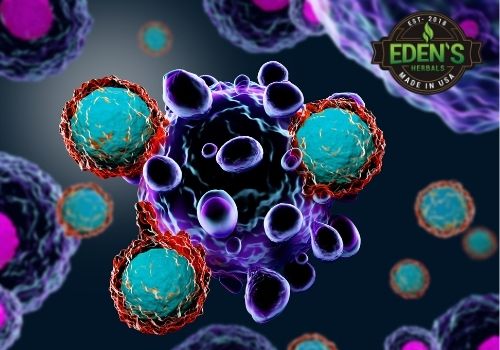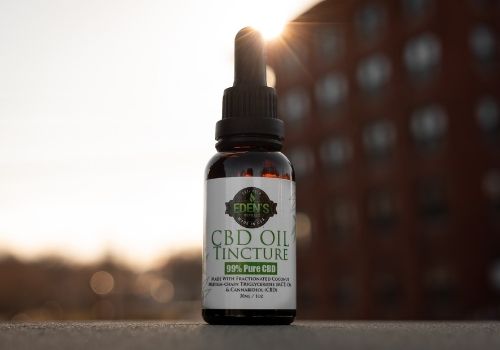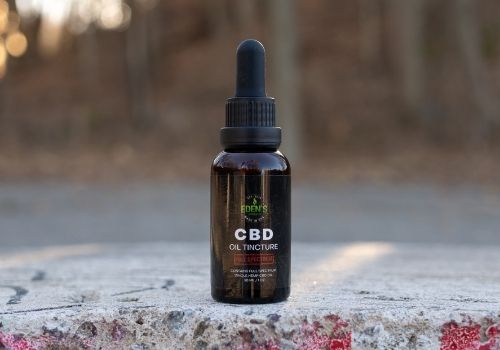 CBD is everywhere these days and its popularity is only growing. With the ability to relieve pain, lower anxiety, and promote overall wellness, CBD has quickly become known as the miracle drug, taking the market by storm.
CBD is everywhere these days and its popularity is only growing. With the ability to relieve pain, lower anxiety, and promote overall wellness, CBD has quickly become known as the miracle drug, taking the market by storm.
Now there is evidence that CBD might help cancer patients to manage or even prevent this deadly disease. Is there truth to these claims, or is it all hype? Let's explore the facts behind CBD for cancer.
CBD products come in many forms. The most common are oils, edibles, and topicals. Unlike marijuana, which is illicit in some parts of the United States, CBD has been legalized federally.
One major difference is the high contents of THC present in marijuana. CBD products can have trace amounts of THC or no amounts at all. They have a wide range of health benefits because they can modulate certain functions in the body.
CBD products work with the endocannabinoid system. This is a system in your body responsible for controlling and regulating body functions such as sleep, appetite, pain, et cetera.
It is due to this reason that it has been exploited in pharmacotherapy to manage certain conditions.
CBD oil has therapeutic applications in diseases involving energy metabolism, inflammation, pain, eye disorders, and musculoskeletal disorders.
It has some health benefits to cancer patients as well, and further research is ongoing about this therapeutic application.
 What is Cancer?
What is Cancer?
Cancer is a serious and debilitating disease characterized by the growth of abnormal cells. These cells replicate at higher rates than normal cells in your body.
They end up infiltrating normal cells and damaging tissues in your body as they spread from one organ to another.
According to Mayo Clinic, cancer rates as the second common cause of death worldwide. This is because it can be detected several years later after it has spread to other body organs.
This is why early screening for cancer diseases is recommended. The sooner the cancer is detected, the earlier treatment can begin. Early treatment prevents further spread of the disease and improves the chances of cure.
Cancer affects many parts of the body. It can be of the cervix, the prostate, the throat, breasts, brain, stomach, colon, lungs, skin, et cetera.
Cancer symptoms vary with the organ affected. However, some symptoms are common across all cancer patients. They include:
1. Weight changes.
2. Fatigue.
3. Chronic joint or muscle pain.
4. Sweating at night or unexplained fevers.
Other symptoms are unique to the type of cancer you might be having. For example, skin cancer comes with symptoms like a lump feeling under the skin and skin color changes like darkening or yellowing, and skin sores that take longer than usual to heal.
Cancer has a variety of causes. However, gene mutations are the most common cause. The mutation can cause the rapid uncontrolled growth of cells or fail to stop the cells from rapidly growing. In normal cells, cell growth is controlled by specific genes.
When there is an increase in cell growth above normal, a gene is responsible for signaling the cells to stop multiplying. In cancer patients, this process is hindered.
 CBD Oil for Cancer
CBD Oil for Cancer
Research shows that CBD oil may be helpful in the treatment of cancer. Let's examine how that might be true.
First, CBD oil can help relieve patients from cancer-related symptoms, particularly pain management.
Second, it helps manage symptoms related to chemotherapy treatment, such as nausea and vomiting. Some studies also reveal that CBD oil can reduce the size of cancer tumors and induce apoptosis. Apoptosis refers to the natural death of damaged cells in your body.
Lastly, frequent doses of CBD oil can help prevent cancer.
Treating Cancer with CBD
CBD oil can relieve symptoms related to cancer, such as pain. Cancer-related pain isn't always relieved by over-the-counter pain medications. If you're struggling with pain from cancer, CBD might be worth a try.
Pain in cancer patients is due to the inflammation of internal tissues that puts pressure against the internal organs and can even injure nerves. The pain can be so severe that it fails to respond to potent pain relievers like opioids. If you have cancer and are seeking ways to relieve pain, CBD oil can help.
The oil reduces pain by modifying the endocannabinoid system. This system can regulate pain in your body. CBD impacts the CB2 receptor activity of the endocannabinoid system to cause pain and inflammation relief.
A study was conducted on 177 cancer patients to investigate CBD and THC's effectiveness in managing cancer-related pain. The study showed that CBD containing some amounts of THC was more effective in alleviating cancer-related pain than the use of CBD alone.
 CBD Oil for Symptoms of Chemotherapy
CBD Oil for Symptoms of Chemotherapy
Cancer treatment usually involves chemotherapy and radiotherapy. Both of these treatments can be brutal for the patient.
Radiotherapy involves the use of radiation or a beam of light to destroy cancerous cells. On the other hand, chemotherapy uses chemicals to treat cancerous cells that are rapidly growing. This type of therapy is very aggressive and causes symptoms such as nausea, vomiting, loss of hair, fatigue, and pain.
CBD helps alleviate vomiting and nausea for cancer patients. The chemotherapy can also cause a lack of appetite, but CBD oil can boost your appetite levels.
CBD Oil for Tumor Cell Death
Some animal models have shown evidence of the effectiveness of CBD in reducing tumor growth. Studies in the previous years have also been effective in supporting this.
These studies began as early as 2010 and are still ongoing. The first study in 2010 was on metastatic breast cancer. The results showed some evidence of reduced cell proliferation and invasion of cancer after CBD use.
In 2014, further studies showed that CBD could prevent the spread of colorectal cancer.
In vivo and invitro recent studies in 2019 show that cannabinoids found in CBD oil can induce the death of tumor cells, inhibit the invasion of healthy tissues and organs, and slow down the growth of the tumor.
However, CBD's effectiveness in slowing down tumor growth and inducing tumor cell death depends on the dose and formulation of the product you are using. CBD oil is the right formulation because it enables higher dosing.
Does CBD Prevent Cancer?
Little evidence is available on the effectiveness of CBD oil in preventing the development of cancer.
However, the available research shows that CBD might have some anti-tumor effects. Studies in animals show that it can prevent prostate cancer, colon, breast, lung, and brain cancer.
In other research, men with a history of tobacco smoking have a lower risk of developing prostate cancer than those who have never smoked tobacco.
Do I Need a Prescription for CBD?
CBD does not require a prescription and is very easy to acquire. It was legalized federally due to the 2018 Farm Bill, making it more accessible than medical marijuana for many in the United States. It's still important to check your state laws and regulations, but CBD can be shipped to all 50 states.
Many stores such as Eden's Herbals sell high-quality CBD products at an affordable price, so you can buy CBD Oil today. They'll even ship it right to your door for free!
 Conclusion
Conclusion
Cancer patients can use CBD oil to manage different types of cancer-related symptoms and improve the side effects of chemotherapy. However, it does not cure the condition.
CBD oil is safe for use in cancer patients. When used to relieve cancer-related and chemotherapy-related symptoms, it is safer than the use of medications.
This is because medications are associated with myriad side effects that may further lower life quality for cancer patients.
Although CBD oil is well-tolerated in many patients, it can have some mild side effects in some patients, such as fatigue, appetite changes, weight changes, and diarrhea.
Furthermore, the use of CBD oil alongside medications like blood thinners, muscle relaxants, antidepressants, sedatives, and anti-epileptic drugs should be avoided. This is because the oil may interact with these medications and damage your liver.
CBD is not a miracle cure-all, but based on the research that's been done, it may be worth a try for cancer patients who are looking for new treatment options in managing their symptoms.
*These statements have not been evaluated by the FDA and CBD is not intended to diagnose, treat, or cure any particular illness or disease. We always recommend consulting a qualified physician before beginning a new CBD regiment


